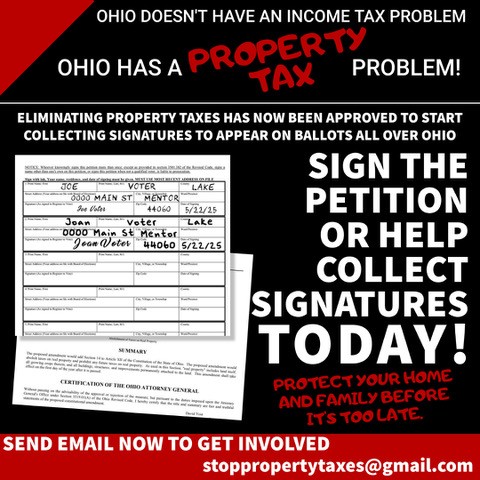It is very clear to most Ohioans that the current property tax system is excessively burdensome on citizens who are least able to pay. It promotes government growth with limited transparency, is overly complex, unsustainable, and disregards your ability to pay. Property ownership in Ohio feels more like renting from the government, hindering true ownership. This limits our freedom, obstructs wealth transfer to future generations, and keeps families in poverty.
The property tax scheme is unfair for a lot of reasons. It pays for townships, schools, county services (small amount) libraries, etc. Someone owning a $200,000 house pays a lower amount than someone owning a $600,000 home for the same services. Let me say that again. We all get to access to the same service but some have to pay more than others. And those that don’t own property pay nothing for services. Is that fair?
How can we pay for these services? What replaces property tax? That is the most asked question. There is a more fair approach. And new approaches can be tailored for each community based on how that community wants to structure them. Far more democratic. While the effort to eliminate property taxes does NOT offer a solution. We know lawmakers along with citizens can devise a more fair approach and we the people should have the ability to vote to approve that approach. Think about it the money to pay for services is already in the system. Today you pay whatever for property tax. For the sake of argument say $5,000. If this law passes that $5,000 goes back into you pocket. Then those who are needing to generate income (say a school) to run their services can devise a more fair funding method. One approach is a local income tax, which is voted on by the community. The schools, for example, who have the ability today by law, to fund by local income taxes, can determine the amount necessary and then place that on a ballot. If passed those who have existing income will pay their share of the due bill. Each according to their incomes. Those with greater ability to pay will pay slightly more. Another possible approach is to fund things via a balanced service fee. You take the cost of a service (education) divide the budget by the population and each citizen is billed for those services. Some portion of the $5,000 you put in your pocket is then used to pay for the services. If you create a spread sheet with hypothetical scenarios you will see we actually pay less.
Using a new funding approach reality changes very little other than the mechanism and the populations paying for the services. Those who have an income pay versus those who are on fixed incomes who have limited ability to pay. Instead of a property tax and income tax, sales tax, or service fee is used. The amount needed does not change only the method to fund the services. The benefit is the overhead expense of the property tax goes away. No more budget commission, or county auditor real-estate services, or township budget officials trying to figure out the levee’s and having to do regular ballot initiatives.
Local property tax, sales tax, and local service fees are a better way to fund schools, township services, etc. Think about it. The property tax system is corrupt and easily manipulated. The state just did a mass update of 30% without any real logic or rational. Technically there should have been an appraisal on each home and then property values adjusted accordingly. That did not happen. The county auditor can change your property value based on subject criteria and/or without any real justification, that changes your property taxes. All these changes to achieve some income goal. Bear in mind this is on homes that are paid for. Someone, on a fixed income, has to pay a large amount on something they worked their whole lives to pay off. Do you pay tax on your car that you paid off, or your boat, or any other asset. It is like paying rent to the government to living in your home. Very corrupt. And the property tax scam is complex. Inside millage, outside millage, 20 mill floor. Who can understand it? And the cost to manage all of the complexity is huge.

